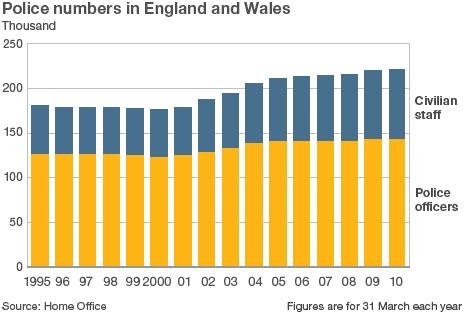Police pay review calls for end to special payments
- Published
Tom Winsor: "The existing system of pay and allowances was designed in the 1970s"
An independent review of police pay and conditions in England and Wales has called for the abolition of a series of allowances and special payments.
Tom Winsor's report recommends, external making savings of £60m a year in overtime.
Officers on front-line duties could see their pay rise, but 40% face wage cuts of up to £4,000 a year.
The Association of Chief Police Officers warns 28,000 jobs may go, and the Police Federation of England and Wales says it would be "devastating".
Mr Winsor says his recommendations will produce savings of £485m in three years - and reinvestment in the "most important police jobs" would mean fewer posts would be lost.
He said the current system needs reform to recognise the "hardest jobs done in the most demanding circumstances".
Salaries had been "designed for a police service and society neither of which any longer exists", he added.
Former rail regulator Mr Winsor said officers who lost out under his reforms would be those in positions largely confined to police stations and not requiring specialist skills and overtime.
But some officers would gain up to £2,000 a year in recognition of their skills and the demands put upon them.
A professional accreditation allowance of £1,200 would be introduced for most detectives, firearms, public order and neighbourhood policing teams.
The review calls for an end to the £1,212 competence-related threshold payment, the Special Priority Payment of up to £5,000 and says no officers should move up the pay scale for two years.
It also suggests suspending chief officer and superintendent bonuses.
Police earn 10 to 15% more than other emergency workers and the armed forces and in some areas such as Wales and the North East they are paid up to 60% more than average local earnings, Mr Winsor's report notes.
The review found all basic pay contained a payment for working unsocial hours, even though only about 57% of lower rank-and-file officers regularly did.
'Very angry'
Mr Winsor says only officers working unsocial hours should be paid for doing so, with those working between 2000 and 0600 getting an extra 10% on their basic hourly pay.
The report also indicates that Mr Winsor's follow-up study on longer-term reforms, expected later this year, will consider the case for a radical rethink of pay grades to allow the salaries of both chiefs and lower ranks to be cut if an officer's performance is found wanting.
The report says "at present officers have too great a say on how they are deployed and if, not when, they leave the service". It calls for an end to what Mr Winsor describes as "secured indolence" by ensuring that police remain police for the right reasons.
Watch: Shadow home secretary Yvette Cooper: "Police will be overstretched"
It also reveals that Mr Winsor is looking at how to subject officers to regular fitness tests, saying there has been a "dramatic" increase in the number of police who are restricted to less physically demanding duties.
"These recommendations will allow the police to provide a more efficient, economical and effective service to the public while providing officers and staff with a fairer deal," he said.
"The service needs modern management tools to operate with the greatest efficiency and economy in a time of considerable national financial pressure and restraint."
The government is planning to cut its £11bn funding for the police by 20% by 2014-15.
The 43 forces in England and Wales currently employ about 244,000 people, comprising 143,000 police officers and 101,000 civilians.
The Acpo estimate for job losses has been made in a confidential memo to ministers published in the Guardian, external.
It predicts the jobs of 12,000 police officers and 16,000 civilian staff will be lost over the next four years as a result of the cuts.
Greater Manchester Chief Constable Peter Fahy, representing Acpo, confirmed the job loss forecast to the Guardian.
He said "hugely difficult" decisions would have to be taken but most forces were realistic sacrifices had to be made.
He said he was pleased bonuses for chief officers had been suspended and that no evidence was found suggesting abuses of overtime were prevalent.
BBC home affairs correspondent Danny Shaw says the Acpo figures are the most reliable figures on police job cuts since the Spending Review last October.
Paul McKeever, chairman of the Police Federation of England and Wales, said: "These recommendations, if implemented, together with the two-year pay freeze and a likely increase in pension contributions, will have a devastating effect on policing."
He said morale was "rock-bottom" and he could not rule out taking judicial action.

Home Secretary Theresa May told the BBC: "With a record budget deficit, we are in exceptional circumstances.
"And with three-quarters of the police budget going on staff, then pay and conditions has to play its role in ensuring we can keep officers jobs, keep officers on the street, and cut crime."
Earlier, Policing Minister Nick Herbert said: "We have to deal with the deficit, and police forces can and must make savings, focusing on back and middle office functions like IT and procurement so that front-line services can be protected."
But shadow home secretary Yvette Cooper said: "The government is cutting too far too fast and hitting the police budget hard, ultimately it is local communities that will pay the price."
- Published8 March 2011
- Published8 March 2011
- Published8 March 2011
- Published2 March 2011
- Published13 December 2010
- Published6 December 2010
- Published22 November 2010